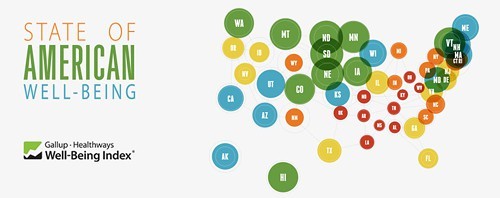
- Gallup-Healthways
Memphis scored low in the annual ranking of well-being from national health care information company Healthways and national polling firm Gallup.
The 2013 rankings were based on surveys from community residents in categories including emotional health, work environment, physical health, and more. Two thousand people in the Memphis area were surveyed for the new ranking, according to Gallup-Healthways.
The community rankings are the newest data from the State of American Well-Being report. State rankings were published in February and Tennessee ranked near the bottom.
Memphis was ranked 135th of the 189 largest communities in the country that were surveyed for the poll. This landed the city right in between Tulsa, Okla. (134) And Pensacola, Fla. (136) Other cities ranked close to Memphis were New Orleans (120) Wilmington, N.C. (126), Knoxville (150), Las Vegas (144), and Modesto, Calif. (151).
Provo, Utah was ranked as the top community in the country for levels of well-being. The worst was the Huntington, W.Va. area. Nashville landed in the 72nd spot. Little Rock was ranked 154th. Jackson, Miss. was ranked 167th.
Tennessee came in at 44th place among the 50 states. The state was ranked in between Missouri (43) and Arkansas (45). Tennessee scored out of the bottom 10 only in the categories of work environment, healthy behaviors, and basic access to health care.
The top state for well-being is North Dakota, according to the ranking. West Virginia is at the bottom of the list. Mississippi ranked 48th.
The ranking is more scientific and meant to be taken more seriously than other national polls that rank cities on, say, their manliness or sweatiness (as Old Spice deodorant used to do), for example. Healthways and Gallup produce the report for community and business leaders to make decisions about their communities.
“For an individual, high well-being means a life well-lived—all the things that are important to each of us, what we think about, and how we experience our lives,” said Healthways CEO Ben Leedle. “In the aggregate, high well-being means healthier populations, more productive and profitable businesses, and more economically vibrant communities.”